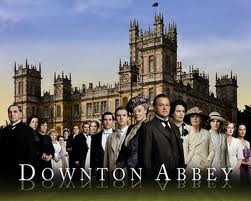 Becky and I are eagerly awaiting the return of Downton Abbey to our Sunday night routine. For those of you who don’t know, Downton Abbey is BBC/PBS mini-series beginning its third eight-episode season. Okay, some people might call it a soap opera, and it is, but it is sophisticated, witty and, well, so British.
Becky and I are eagerly awaiting the return of Downton Abbey to our Sunday night routine. For those of you who don’t know, Downton Abbey is BBC/PBS mini-series beginning its third eight-episode season. Okay, some people might call it a soap opera, and it is, but it is sophisticated, witty and, well, so British.
Downton Abbey itself is the fictional Yorkshire manor house of Lord and Lady Grantham, their three daughters, the earl’s mother, the Dowager Countess, and a host of downstairs servants. The stories that were told in the first two seasons took us through the years just prior to and during the First World War. The third season will take us into the 1920’s. There are ominous clouds of change and, we are told, tragedy on the horizon.
Downton Abbey, yes, something of a soap opera, is its own cultural phenomena on both sides of the Atlantic. (The BBC has already run Season Three and spoilers are being spilled across the Internet, so beware.)
Downton Abbey is the creation of producer Jullian Fellowes and by all accounts it is good television. There’s more to it than location, costumes and good acting. Sure, some people will decide to watch Family Guy, The Biggest Loser or an NCIS rerun, but there’s something about Downton Abbey that has caught a lot of us.
Somehow Downton Abbey with its costumes and faraway world of valets, butlers, lady maids and chauffeurs connects with our ordinary lives nearly a hundred years later. The lives of those who live upstairs and downstairs in Downton Abbey are complicated. Rich heiresses and scullery maids make bad choices with unintended consequences. Some characters are treacherous, but every so often they do noble things. And the noble characters are not immune from betraying those they love. And they all live in a time of largely unwelcome change.
We watch Downton Abbey because on the opulent sets and through the period dress we see ourselves. We cringed at Lady Mary’s bad decisions because we know what it is to make bad choices. We know to not trust the footman Thomas because there are untrustworthy people who populate our worlds, as well. We understand the discomfort of change that comes even when we do not welcome it.
Julian Fellowes, the creator or Downton Abbey, is no Leo Tolstoy or Victor Hugo; he doesn’t pretend to be so. He has given us an upscale soap opera to fill our Sunday evenings with good entertainment and just enough substance to makes us think.
I have no idea as to whether or not Julian Fellowes is a man of faith. But it is clear that faith plays no role in the lives of those who live at Downton Abbey. There is among them no Jean Valjean as in Hugo’s Les Miserables or Nikolai Levin as in Tolstoy’s Anna Karenina to reflect on the meaning of Christian faith, forgiveness and redemption.
Fellowes decided not to include or did not know that he might have included faith in the lives of the ordinary people who live their lives in that extraordinary place called Downton Abbey. Who knows what a faithful Lady Mary or a Christ-focused Lord Grantham might have done.
We watch Downton Abbey to be entertained, but along the way we are compelled to think of our ordinary lives. We are more than mere actors following the script that was given us. We have a choice to include faith, a focus on Christ, in our lives. The story is better if we do.
